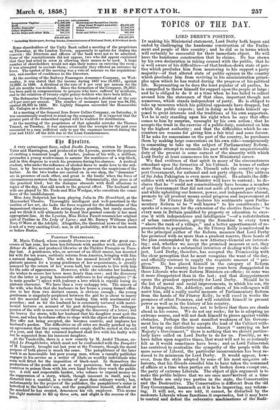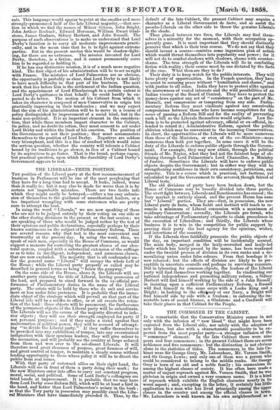TOPICS OF THE DAY.
LORD DERBY'S POSITION.
IN making his Ministerial statement, Lord Derby both began and ended by challenging the handsome construction of the Parlia- ment and people of this country ; and he did so in terms which will certainly be successful for their immediate object. He will have the handsome construction that he claims. He has shown by his own declaration in taking counsel with the public, that he is well aware of his difficulties—of that broken-down state of par- ties which precludes him from mustering to his support a party majority—of that altered state of public opinion in the country which precludes him from reviving in his administration princi- ples upon which he has rested during the progress of his political life. Representing as he does the least popular of all parties, he is compelled to throw himself for support upon the people at large ; and he is obliged to do it at a time when he has failed to collect around him the statesmen of that class, important though not numerous, which stands independent of party. He is obliged to take up measures which his political opponents have dropped, but which the public expects ; and in doing so he finds himself op- posed to great interests and the traditions of his own supporters. Yet he is only standing upon his right when he says that office comes to him by surprise, unsought by his own action ; that he accepts the trust in the exercise of a public duty, conferred on him by the highest authority ; and that the difficulties which he en- counters are reasons for giving him a fair trial and some favour. If he asks for concessions on the part of the country, he purchases them by making large concessions on his own side--conspicuously in consenting to take up the subject of Parliamentary Reform. The simple attempt to reconcile his past with that unquestionable duty of the present is some earnest of the sincerity with which Lora Derby at least commences his new Ministerial career. We find evidence of that spirit in many of the circumstances attendant upon the formation of his Cabinet. In terms of rather more than usual deference Mr. Disraeli asks the country to sup- port Government, for national and not party objects. The address of Sir John Pakington is even more explicit. He admits the diffi- culties with which the new Ministry will have to contend ; he de- clares that he " could not conscientiously have become a member of any Government that did not cast aside all narrow party views, and while upholding our honour, power, and independence abroad, promote by all prudent means social progress and improvement at home." Sir Fitzroy Kelly declares his sentiments upon Parlia- mentary Reform to be "well known" to his constituents ; he speaks of a measure for the extension of the elective franchise "to every man in Britain qualified by property or education to exer- cise it with independence and intelligence "—of a redistribution of urban constituencies giving the franchise to every town "above the rank of a village," and a better apportionment of re- presentation to population. As Sir Fitzroy Kelly is understood to be the principal author of the Reform measure that Lord Derby has promised with no more than a prudent reserve these heads of the plan contemplated by the new Attorney-General are interest- ing; and, whether we accept the promised measure or not, they show that there is a substantial intention of dealing with the sub- ject. Lord Derby, therefore, has accepted the Premiership with the clear perception that he must recognize the want of the day, and officially contract to supply the requisite amount of " pro- gress." He has placed himself in the category of Reform • isters. The country has for some years been disappointed in those Liberals who were Reform Ministers ex-officio ; in none was it more disappointed than in the last ; and that disappointment opens the grandest opportunity for Lord Derby. Should he.to the list of moral and social improvements, in which his son, Sir John Pakington, Mr. Adderley, and others of his colleagues will assist him, add a really useful measure of Parliamentary Reform from the hands of Sir Fitzroy Kelly, he will excel in works the promises of other Premiers, and will establish himself in present power as well as in the history of his country. It is impossible, however, not to believe that there are shoals ahead in his course. We do not say rocks ; for he is adopting no extreme course, and will not dash himself to pieces against visible obstacles. Perhaps the most manifest weakness of his Govern- ment lies in the fact that he accepts the lead of the Cabinet with- out having any distinctive mission. Except "carrying on her Majesty's Government," there is nothing that we should particu- larly have called on Lord Derby to do for us. Possibly, as we have fallen upon negative times, that want will not be so seriously felt as it would sometimes have been ; and as Lord Palmerston has contrived to neutralize the sympathy of the people with the mere name of Liberal, the particular inconvenience has been re- duced to its minimum for Lord Derby. It would appear, how- ever, from the style adopted by some of his most sanguine ad- herents, that his friends consider him to have taken the command of affairs at a time when parties are all broken down except one, the party of extreme Liberals. The object of 11is argument is to make the public believe that we are once morearrived at a time when there are only two parties in the state, the Conservative and the Destructive. The Conservative is different from the ld Tory Government, inasmuch as it is to be improving, nay reform- ing. It will not, we are told, it cannot, be disturbed by the moderate Liberals whose functions it supersedes, but it may have to control and defeat the subversive machinations of the Radi-
cals. This language would appear to point at the smaller and more strongly-pronotinced half of the late Liberal majority,—that sec- tion in which we find the names of Milner Gibson, John Bright, John Arthur Roebuck, Edward llorsman, William Ewart Glad- stone, James Graham, Sidney Herbert, and John Russell. The purpose of such observations is to make us understand that Lord Derby's function is to carry all moderate improvements practi- cally, and in the mean time that he is to fight against extreme parties. But in the present session this would be shadow-fight- ing, for there are no extremes. The mission invented for Lord Derby, therefore, is a fiction, and it cannot permanently serve him to be regarded as holding it. If he has any distinctive mission, it is of a much more negative kind. The first object of his administration will be to set us right with France. The mistakes of Lord Palmerston are so obvious, the opportunity is probably so clear, that Lord Derby is not likely to have much difficulty in that part of his business. The next work that lies before him is the settlement of the Indian question, and the appointment of Lord Ellenborough to a certain extent is Lord Derby's quittance in that behalf; he could hardly be ex- pected to do better. The section of his Cabinet from which it takes its character is composed of men Conservative in origin but practically improving in their tendencies ; and we may expect that the aim of his administration will be to move in a course of policy distinguished by improvement of a social kind, but in the main non-political. It is an important element in the considera- tion, that while those members impart character to the Cabinet, its policy, and no doubt its action, they must consent to act under Lord Derby and within the limit of his sanction. The position of the Government is not their position ; they must accommodate themselves to the position of Lord Derby. Negatives are seldom very triumphant, and this is a line of conduct which would raise the serious question, whether the country will tolerate a Cabinet bound by its traditions to go slower, in lieu of a Cabinet bound by its aspirations to go faster. That is the broad, perhaps vague, but practical question, upon which the durability of Lord Derby's Government appears to rest.



































 Previous page
Previous page